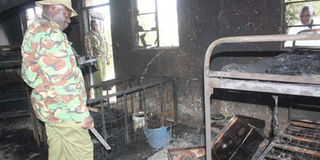To nip student unrest in the bud, we must improve living conditions in public schools

This photo dated July 19, 2016 shows a police officer in a dormitory at Kiambogo High School in Naivasha that students from the institution had burnt the previous day. PHOTO | MACHARIA MWANGI | NATION MEDIA GROUP
What you need to know:
The government has appointed a team to look into the causes of unrest.
It ought to start with the basics.
Improve the living conditions by decongesting dormitories and dining halls, improve the diet and make learning fun.
- Otherwise, boarding schools can hardly ever be value for all the money pumped into them.
Millions of parents whose children are enrolled in boarding schools must have heaved a collective sigh of relief last month when the government signed the first ever Collective Bargaining Agreement with teachers.
This sense of solace was borne out of the hope that the perennial teacher strikes to press for higher pay would end.
But, as the last two months have shown, ending the teacher strikes curse though necessary, merely scratched the surface in trying to restore national confidence in the public education sector especially in boarding secondary schools.
Since the beginning of the term, at least 90 boarding secondary schools have been hit by a wave of fire attacks.
Obvious questions come to mind: Why would students who in ordinary circumstances would be expected to respect their schools and be proud of them want to pull them down in inexplicable attacks? How do they manage to sneak out of school, buy petrol, bring it back to school undetected? Why do these attacks happen only in the second term? Is there a communication breakdown between students and teachers? Are boarding schools worth the money spent on them?
MOCK EXAMS
To attribute the second-term chaos to pressure arising from mock examinations for the candidates and fatigue borne out of an extended term, as past task forces appointed to look into the matter have done, is to merely gloss over the underlying problems in the institutions.
For if these deadly fire attacks can simply be explained by pent-up pressure and fatigue, why is it that day scholars and those in private schools don’t experience such frustrations yet they study the same syllabus to prepare them for the same examinations?
Fingers must surely be pointed at the living conditions in public boarding secondary schools. Anyone who has had a chance to enter a dormitory can attest to their cluttered, putrid and filthy conditions. Because the beds are usually lined up against each other from wall to wall, it is never possible to do a thorough cleaning job. They are the eternal symbol of bondage and it’s little wonder they are the first to go up in flames during protests.
The happiest moments in most boarding schools are during mid-term breaks and holidays at the end of term for they symbolise liberation from school bondage.
Most students in boarding schools are from well-off families because the fees are out of reach for the less well to do. The average boarder is therefore one who in all likelihood owns a mobile phone, is used to watching TV, listening to the radio and has access to the Internet at home. Locking him up away from these technological platforms is like putting a care-free movie actor in a monastery… they will soon break free.
While it makes sense to regulate television time and outlaw mobile phones in school, the modern boarding school should create appropriate activities to make life enjoyable. Life in these schools should be structured but certainly not regimented and extra-curricular activities must be expanded.
The government has appointed a team to look into the causes of unrest. It ought to start with the basics. Improve the living conditions by decongesting dormitories and dining halls, improve the diet and make learning fun. Without that, boarding schools can hardly ever be value for all the money pumped into them.
Kariuki Waihenya is a ‘Daily Nation’ editor; [email protected].




